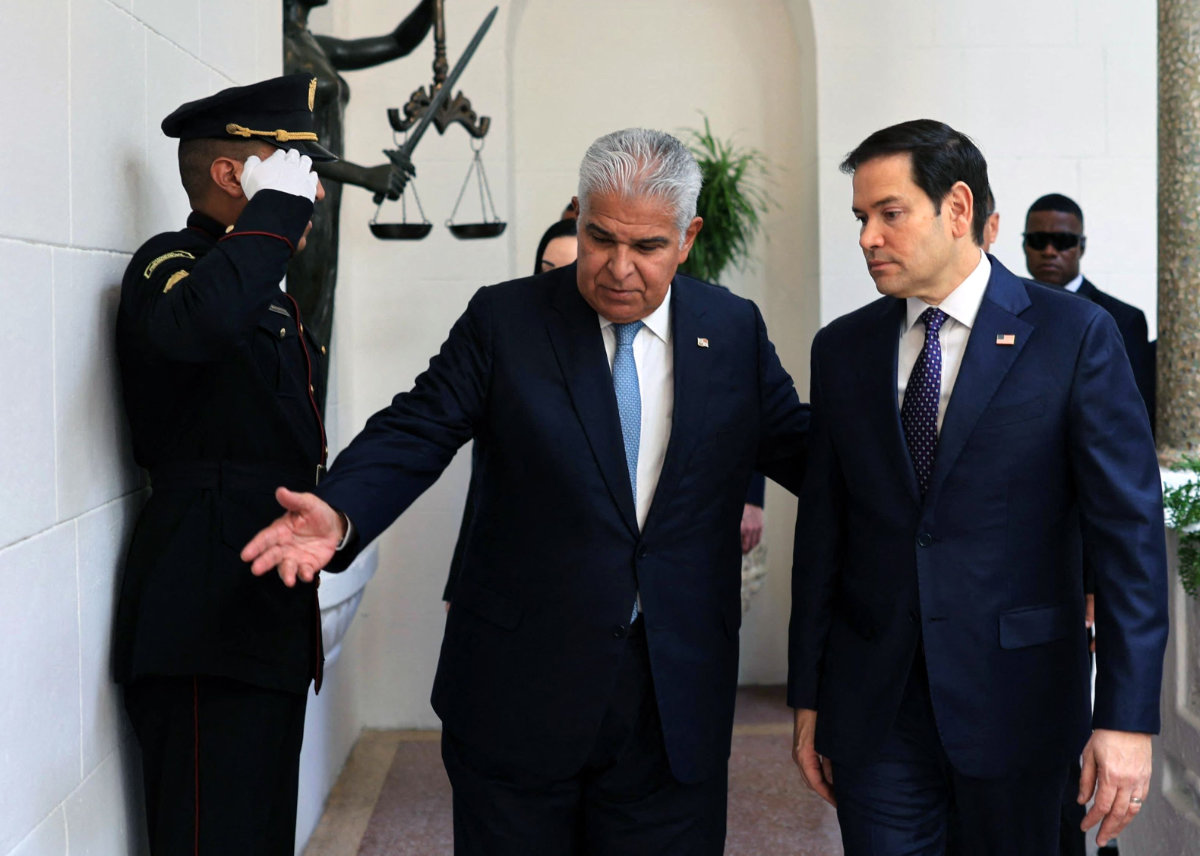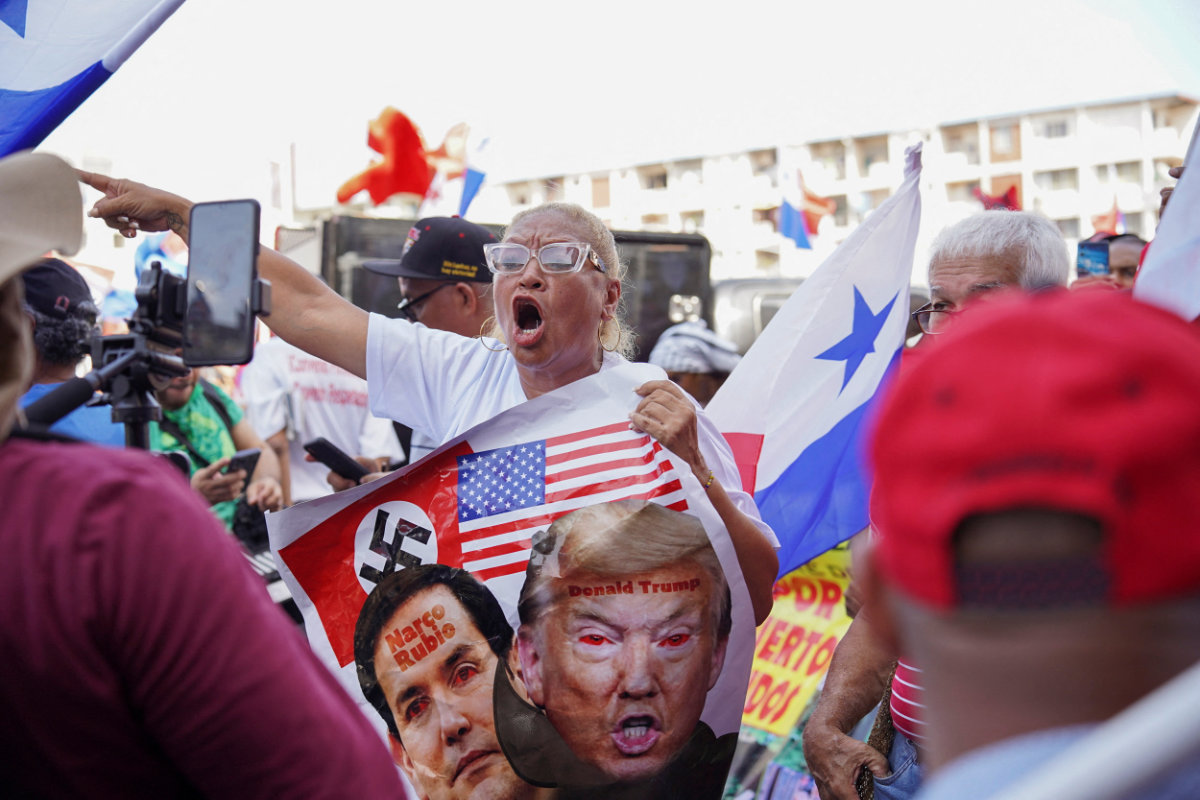WASHINGTON: President Donald Trump said he will discuss the punishing tariffs he has levied on Canada and Mexico with both countries on Monday, after arguing that Americans may feel economic “pain” from the 25 percent duties but that it will be “worth the price.”
Speaking to reporters after he flew back to Washington Sunday evening from a weekend in Florida, Trump said he was “speaking with Prime Minister (Justin) Trudeau tomorrow morning, and I’m also speaking with Mexico tomorrow morning.”
“I don’t expect anything very dramatic,” he added.
Trump has also hit China with a 10-percent tariff in addition to levies already in place.
A fervent supporter of tariffs, Trump had always maintained that their impact would be borne by foreign exporters, without being passed on to American consumers, contradicting the opinion of a broad range of experts.
Earlier Sunday he acknowledged, in a series of messages on his Truth Social network, that Americans may feel economic “pain” from his tariffs, but argued it would be “worth the price” to secure US interests.
China, Mexico and Canada are the top three US trade partners and all have vowed to retaliate when the tariffs take effect Tuesday.
“Will there be some pain? Yes, maybe (and maybe not!)” Trump wrote Sunday morning in all-caps on his Truth Social media platform.
“But we will Make America Great Again, and it will all be worth the price that must be paid.”
Analysts expect the trade war to slow US growth and increase prices, at least in the short term, something the president had resisted acknowledging after frustration over rising costs was seen as a major factor in his 2024 election win.
Seeking to limit a spike in fuel prices, Trump has put the levy on energy imports from Canada at only 10 percent.
The president has cited illegal immigration and the trafficking of the deadly opioid fentanyl as reasons for the “emergency” measures.
But on Sunday he also expressed general outrage at trade deficits, which he has long viewed as signs of unfair treatment against the United States.
“The USA has major deficits with Canada, Mexico, and China (and almost all countries!), owes 36 Trillion Dollars, and we’re not going to be the ‘Stupid Country’ any longer,” he wrote.
The tariffs announcements capped an extraordinary second week of Trump’s new term, with the president facing the worst US aviation disaster in years — even as his administration moved to drastically overhaul the government in actions decried by critics as illegal.
While some economies believe the levies are likely to be temporary, the outlook is unclear because the White House set very general conditions for their removal.
A White House fact sheet gave no details on what the three countries would need to do to win a reprieve.
Trump vowed to keep them in place until what he described as a national emergency over fentanyl, a deadly opioid, and illegal immigration to the United States ends. China left the door open for talks with the United States. Its sharpest pushback was over fentanyl.
Canada hits back
In a separate social media post, Trump took particular aim at Canada, repeating his call for America’s northern neighbor to become a US state.
Claiming the United States pays “hundreds of billions of dollars to SUBSIDIZE Canada,” Trump said that “without this massive subsidy, Canada ceases to exist as a viable Country.”
“Therefore, Canada should become our Cherished 51st State,” he said, reiterating the expansionist threat against one of his country’s closest allies.
The US Census Bureau says the 2024 trade deficit in goods with Canada was $55 billion.
Canadian backlash was swift, with video posted to social media showing fans at a Toronto Raptors game Sunday booing during the US national anthem.
Canada said on Sunday it will take legal action under the relevant international bodies to challenge the tariffs.
Prime Minister Justin Trudeau also encouraged Canadians on Sunday to boycott their longtime ally after ordering retaliatory tariffs against $155 billion of US goods, from peanut butter, beer and wine to lumber and appliances.
Canadian officials said they were preparing measures to help business who might be hurt by the trade war.
Trudeau vowed Saturday to hit back with 25 percent levies on select American goods worth Can$155 billion ($106.6 billion), with a first round on Tuesday followed by a second one in three weeks.
Leaders of several Canadian provinces have already announced retaliatory actions as well, such as the immediate halt of US liquor purchases.
The White House has not publicly announced what actions could end the tariffs.
“It’s hard to know what more we can do, but we’re obviously open to any other suggestions that come our way,” Canada’s ambassador to the United States Kirsten Hillman told ABC News on Sunday.
Mexico, China push back
Mexican President Claudia Sheinbaum said she, also, was awaiting Trump’s response to her proposal for dialogue.
She said she had directed her economy minister to “implement Plan B,” which includes unspecified “tariff and non-tariff measures,” promising to detail Monday the steps she intends to take.
Trump said Sunday he also planned to hit the European Union with tariffs “pretty soon,” to which the EU said earlier it would “respond firmly.”
“Fentanyl is America’s problem,” China’s foreign ministry said, adding that China has taken extensive measures to combat the problem.
Mexican President Claudia Sheinbaum, raising her fist in the air in a speech outside the capital, vowed resilience.
She accused the United States of failing to tackle its fentanyl problem and said it would not be solved by tariffs.
Sheinbaum said she would provide more details on Monday of the retaliatory tariffs she ordered this weekend.
Warnings of inflation, recession
EY Chief Economist Greg Daco said Trump’s tariffs could reduce US economic growth by 1.5 percentage points this year, throw Canada and Mexico into recession and usher in “stagflation” — high inflation, stagnant economic growth and elevated unemployment — at home.
Trump’s move was the first strike in a what could be a destructive global trade war that Paul Ashworth of Capital Economics said would lead to a surge in US inflation that would “come even faster and be larger than we initially expected.
US crude oil futures jumped more than $2 to hit $75 per barrel, while stock futures fell. The S&P 500 E-mini futures were down 2 percent, while Nasdaq futures were down 2.75 percent.
The Trump tariffs, outlined in three executive orders, are due to take effect 12:01 a.m. ET (0501 GMT) on Tuesday. Markets were awaiting developments with anxiety, but some analysts said there was some hope for negotiations, especially with Canada and China.
“The tariffs look likely to take effect, though a last-minute compromise cannot be completely ruled out,” Goldman Sachs economists said in a note Sunday.
The tariff announcement made good on Trump’s repeated 2024 campaign threat, defying warnings from economists that a trade war would erode growth and raise prices for consumers and companies.
Trump declared a national emergency under two laws, the International Emergency Economic Powers Act and the National Emergencies Act, which give the president sweeping powers to impose sanctions to address crises.
Trade lawyers said Trump could face legal challenges for testing the limits of US laws. Democratic lawmakers Suzan DelBene and Don Beyer decried what they called a blatant abuse of executive power. Others warned about rising prices.
“No matter which way you slice it: costs are going to climb for consumers,” Senate Democratic Leader Chuck Schumer said, vowing to try to “undo this mess.”
Republicans welcomed Trump’s action.
A Reuters/Ipsos poll released last week showed Americans were divided on tariffs, with 54 percent opposing new duties on imported goods and 43 percent in support, with Democrats more opposed and Republicans more supportive.
Investors look ahead
Investors were considering the effects of additional tariffs promised by Trump, including those related to oil and gas, as well as steel, aluminum, semiconductor chips and pharmaceuticals. Trump has also vowed actions against the European Union.
A European Commission spokesperson said the EU “would respond firmly to any trading partner that unfairly or arbitrarily imposes tariffs on EU goods.” Europe’s biggest carmaker, Volkswagen, said it was counting on talks to avoid trade conflict.
Automakers would be particularly hard hit, with new tariffs on vehicles built in Canada and Mexico burdening a vast regional supply chain where parts can cross borders several times before final assembly.
Trump imposed only a 10 percent duty on energy products from Canada after oil refiners and Midwestern states raised concerns. At nearly $100 billion in 2023, imports of crude oil accounted for roughly a quarter of all US imports from Canada, according to US Census Bureau data.
White House officials said Canada specifically would no longer be allowed the “de minimiz” US duty exemption for shipments under $800. The officials said Canada, along with Mexico, has become a conduit for shipments of fentanyl and its precursor chemicals into the US via small packages that are not often inspected by customs agents.


































